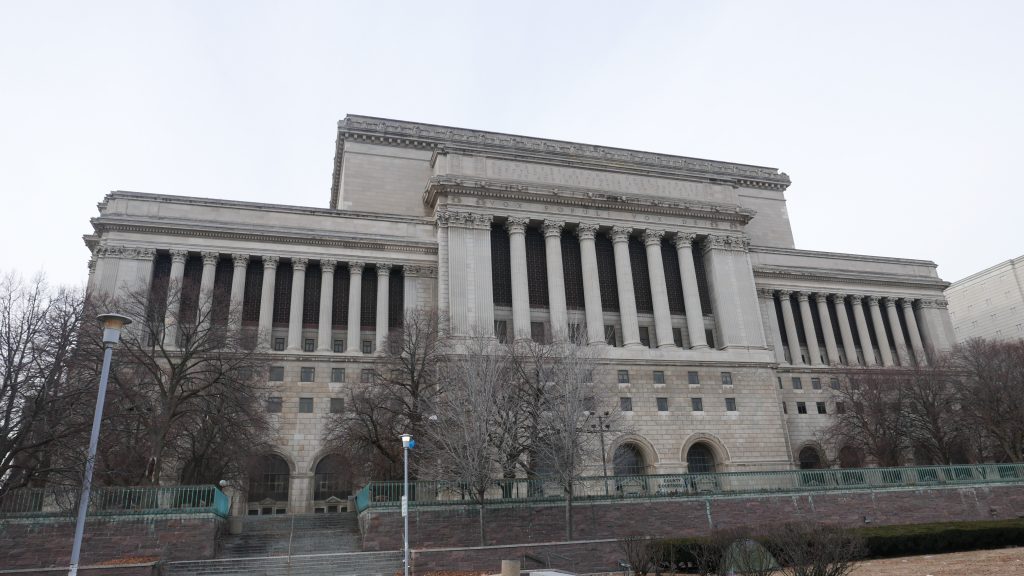Report Says Bad Times Just Beginning For Milwaukee County
A report by the Wisconsin Policy Forum says budget cuts in 2026 likely to continue in successive years.

Milwaukee County Courthouse. Photo by Graham Kilmer.
Financially speaking, the good times are over for Milwaukee County, and the bad times have really only just begun, according to a new report from the Wisconsin Policy Forum.
Milwaukee County Executive David Crowley‘s administration has managed to close a roughly $47 million budget deficit projected by the Milwaukee County Comptroller earlier this year. But the budgetary moves used to close the deficit won’t work forever, and service cuts will likely get worse in future budgets.
To balance the $1.3 billion budget, the county is planning the largest property tax hike in two decades, and a sizable $9.8 million withdrawal from a reserve account set up to pay the county’s debts, which are also expected to increase in the coming years. Lower state charges, increased revenue from the state, tamping down on salary increases and growing sales tax collections are also helping to close the gap.
WPF agrees with Crowley that the county’s budget would be far worse were it not for policy wins at the state level. Notably, the administration’s successful lobbying for 2023 Wisconsin Act 12, which provided an additional 0.4% sales tax and a pathway to closing out the county’s troubled pension system.
However, for WPF, the 2026 budget signals that the county’s fundamental financial challenges remain, and that “service reductions may need to extend to other county departments in future years.”
For now, the major service reductions are concentrated within the Milwaukee County Transit System (MCTS) and Behavioral Health Services (BHS), a division of the Department of Health and Human Services (DHHS). MCTS is particularly hard hit. The system is planning a 15% cut in service and elimination of six routes.
The Milwaukee County Sheriff‘s Office (MCSO) and the Community Reintegration Center (CRC) both received additional funding for overtime. But both agencies regularly exceed their overtime budgets, which officials say is due to chronic understaffing. The $3.6 million for the MCSO is well short of the $8.6 million overtime deficit the agency us projecting this year, WPF noted.
Despite the financial hurdle of a large budget deficit, the county does manage to fund a handful of major capital projects, including a new $13 million entranceway for the Milwaukee County Zoo and a $5 million installment for rehabilitation of the Mitchell Park Domes. But the infrastructure spending is not enough to lower the backlog of $1 billion in projects needed over the next five years.
The county is also managing to keep development of a new criminal courthouse going, using $16 million in property tax funding freed up by new revenue from the state for MCSO expressway patrol. Still, the WPF regards the project as a “huge fiscal challenge” for the county.
“While critical to the county’s ability to provide safe and efficient public safety services, the cost will be prohibitive with an estimated $458.4 million required to finance the project from 2026 through 2032,” WPF reported, adding that the project will drive up the county’s borrowing costs, which are already going up for the new Nature & Culture Museum of Wisconsin and the Forensic Science Center.
WPF’s analysis of the 2026 budget yielded four main takeaways. First, the long-discussed fiscal cliff in transit is here. Federal stimulus funding has run out, pre-pandemic ridership has not returned and service is being cut and likely not for the last time. Second, health care costs, once a source of savings, are now dragging down the county budget. Third, property taxes are rising and policymakers will need to consider their impact on affordability. Fourth, core services — behavioral health and transit — are being cut. These areas will likely see cuts in the future, as well, but other departments won’t be spared forever, and the service cuts are likely to spread.
Things could be worse, WPF concedes. New revenues secured since the onset of the COVID-19 pandemic are easing the pain for policymakers returning to annual deficit budgeting.
“But the budget also takes only an initial step to address the transit system’s structural gap, and it fails to make a dent in the infrastructure backlog,” WPF writes. “The need to grapple with those items in future budgets while also contending with escalating debt service and continued growth in salary and benefit costs suggests that next year may only be the first of several successive years of increasingly painful budgets.”
Legislation Link - Urban Milwaukee members see direct links to legislation mentioned in this article. Join today
If you think stories like this are important, become a member of Urban Milwaukee and help support real, independent journalism. Plus you get some cool added benefits.
More about the 2026 Milwaukee County Budget
- Transportation: MCTS Budget Picture Keeps Getting Worse - Graham Kilmer - Dec 4th, 2025
- Transportation: MCTS Avoids Full Route Cuts Under New Plan - Graham Kilmer - Nov 27th, 2025
- MKE County: Crowley Signs $1.3 Billion Budget Without Vetoes - Graham Kilmer - Nov 11th, 2025
- County Executive Crowley, Chairwoman Nicholson-Bovell Approve 2026 County Budget - David Crowley - Nov 7th, 2025
- MKE County: Board Adopts 2026 Budget, Reduces Size of MCTS Cut - Graham Kilmer - Nov 6th, 2025
- Supervisor Sequanna Taylor Highlights Key Co-Sponsorships in 2026 Milwaukee County Budget - Sequanna Taylor - Nov 6th, 2025
- Supervisor Martin Applauds Board Approval of Cooper Park Repair Amendment - Sup. Felesia Martin - Nov 6th, 2025
- Milwaukee County Board Advances Budget Amendments to Strengthen Transit, Health, Housing, and Family Well-Being While Reducing the Tax Levy - County Board Chairwoman Marcelia Nicholson - Nov 6th, 2025
- Milwaukee County Executive David Crowley Statement on 2026 Amended Budget - David Crowley - Nov 6th, 2025
- Transportation: Supervisors Use Parliamentary Moves To Save MCTS - Graham Kilmer - Oct 31st, 2025
Read more about 2026 Milwaukee County Budget here
Political Contributions Tracker
Displaying political contributions between people mentioned in this story. Learn more.
MKE County
-
Key Questions in Dugan Trial Take Shape on First Day
 Dec 15th, 2025 by Graham Kilmer
Dec 15th, 2025 by Graham Kilmer
-
FTA Tells Milwaukee to Crack Down on Fare Evasion — Even Where Fares Don’t Exist
 Dec 12th, 2025 by Graham Kilmer
Dec 12th, 2025 by Graham Kilmer
-
Legal Filing Describes ‘Horrid Living Conditions’ at County Jail
 Dec 11th, 2025 by Graham Kilmer
Dec 11th, 2025 by Graham Kilmer



















MKE County funding cuts to Behavioral Health, Legal Aid & Transit have a crushing impact on disadvantaged people.
Human beings are most important.
Forget new Zoo Entrance, new Courthouse and Parks.
Explain why we need a new $13 million entranceway for the Milwaukee County Zoo…
Explain why we need to build a new $490 million Courthouse…
Explain why older adults and those unable to drive and those without sufficient income have to suffer with cuts to Milwaukee County Transit…
Explain why the needs of the sheriff’s office are more criticial and need more funding for their overtime rather than hiring more staff or using municipal police from the city and suburbs…
Is our continuing fiscal crisis due to the pension scandel of a few years ago? Isn’t there a novel fiscal option that can attenuate or segregate this persistent monkey on our backs?
Why would we want to make our community even more unattractive to people wishing to relocate here because of increased property taxes without hopes for remediation– ever!
Why can’t we demand that retired people wishing to return to work without adverse outcomes to their federal Social Security or Medicare/Medicaid?